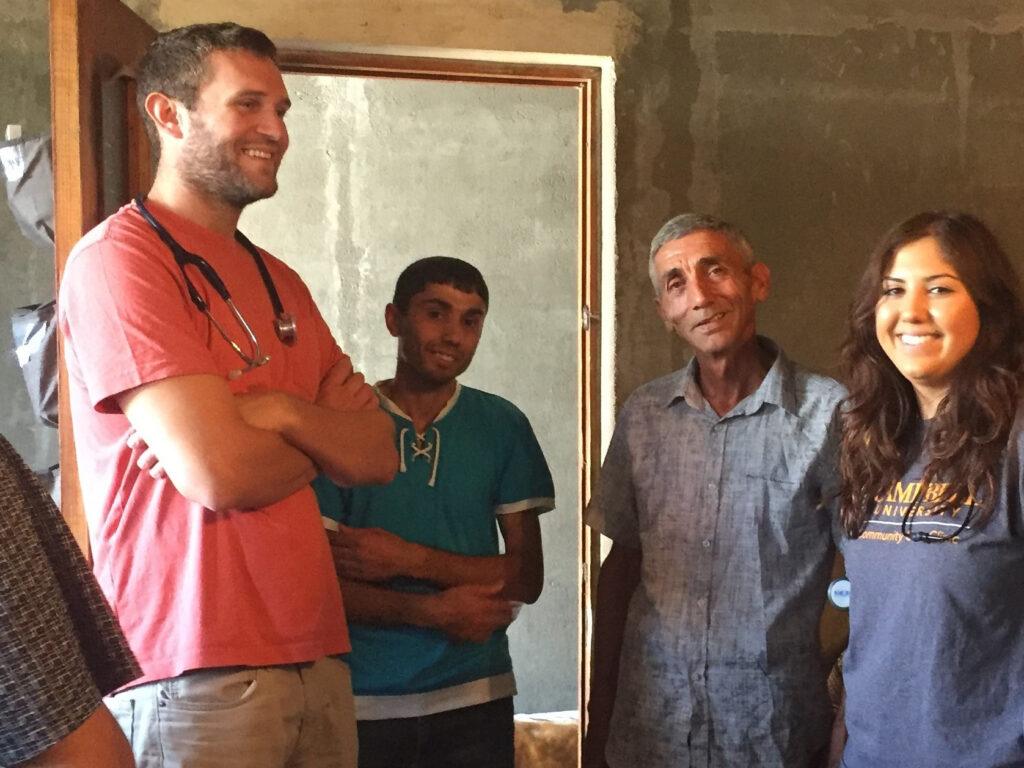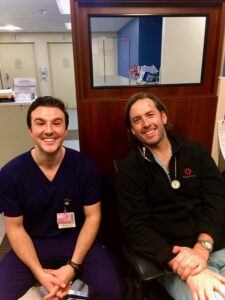Fulfilling the Mission: The Class of 2020 in Campbell Residency Programs

Eighteen members of the Class of 2020 will enter a Campbell University Affiliate Residency Program in July bringing the total number of Campbell Medicine Alumni to continue their training over the past four years in a Campbell Residency to sixty-one including Emergency Medicine Chief Residents at Cape Fear Valley Health and Southeastern Health. Four members of the Class of 2020 share their reflections on why they chose to continue their physician training with Campbell University.
Part 2: Rural Affiliate Hospitals
Jacob Pearce
Emergency Medicine, Southeastern Health
Hometown: Tarboro, NC
Undergraduate University: North Carolina State University
What brought you to medicine?
I started off in undergrad wanting to go to medical school, and then got away from that idea and began my career working in an agriculture-biotech laboratory in RTP after graduation. But, it didn’t take long for me to realize I missed interacting with people and having a direct outcome and impact. I started looking back at medicine and started doing some shadowing and volunteering at a clinic in Raleigh to build my resume up for applying to medical school.
Why Campbell?
Location—all of my family is in North Carolina, and it was a new school with a new facility in a non-urban setting. That really appealed to me.
Why Emergency Medicine?
Coming in, you don’t know that much and don’t know exactly what you want to do. I had the picturesque rural, family physician in my mind; that was my plan until I started doing rotations and realized I really enjoyed the Emergency Department. I was fortunate to do a rotation in the ED at Cape Fear Valley during my third year and got a taste of it. I really liked EM because you get a little bit of everything—people coming in with boo-boos and heart attacks. People come in as a blank slate. They come in with complaints, but it’s kind of a mystery—is it really bad or something minor? Traumas were exciting as a student, but now, facing the added layer of responsibility as a resident physician, I’m really hoping we don’t have many of those days.
I’m excited! Being around emergency medicine doctors and residents, you know they have a good handle on what they are doing, and its good to know they were in my shoes not long ago. You don’t know how steep the learning curve is—how hard it is to get to that point, but, it is doable. I know I will be with strong physicians and residents who know what they are doing. In the ED, there is always the element of the unknown— you never know what someone is going to come in with, and we don’t know everything—that is one of my bigger anxieties.
Why Southeastern Health?
They were high on my match rank list based on location. I liked some programs farther away, but being out of state and in an urban setting isn’t attractive to me. In larger hospitals – massive places – you don’t know who’s-who and who you are handing your patients off to. I did an audition rotation at Southeastern, and everyone was very friendly, helpful and open. At other programs, they definitely didn’t have that sense of comradery. It is a pretty busy ED, but it is a smaller environment – not as hectic all the time. All of the staff and hospitalists know each other; everyone is very cordial and have a sense of community. In Lumberton, I just got a good feeling, and Ben McMichael (DO ’17) is chief resident there now, so I’m looking forward to working under his leadership.
What experience during medical school was the most meaningful?
I went on the Armenia mission trip and that was a good, meaningful experience. We were a small group – Dr. Kaprielian, Dr. Paolini, myself and three other students. We learned a lot and got a lot of one-on-one attention with attendings. It was interesting to be in another country, to see health care there – the differences, and getting to go into small villages and provide health care. That was really nice.
Jarett Casale
Dermatology, Sampson Regional Medical Center
Hometown: Cary, NC
Undergraduate University: NC State University
What led you to the dermatology residency at Sampson Regional?
I did a lot of away rotations 4th year; you need to for dermatology. Show your face to other programs and give them an idea of who you are as an applicant. It’s a bigger thing in the DO world than the MD world, but still very important. I did a rotation with Dr. Crane at Wilmington and Sampson and absolutely loved it. The camaraderie of the residents there was truly incredible. It felt like they were a big family. They gathered together almost every morning especially on didactic days. They all respect and want to help one another which was really awesome to see because not all residency programs have that team-based atmosphere. Also, being close to home for me was really important. I’m from the area, and I would love to be close to my family if I can. It was a well rounded picture – the training is amazing, Dr. Crane, all the resident camaraderie, and being close to home – all those things together. It worked out amazingly, and I couldn’t be happier.

Staying with Campbell, that has supported me all along, is also a huge plus. Working in a small community based hospital, I’m excited about that because I will get a lot of hands-on training and be with the attending a lot, so I’m looking forward to that aspect of the program as well.
Why Dermatology?
During third year, I had my eye on ENT or surgical sub-specialty, but I realized in Dermatology you get to do a lot of hands-on procedures which is something I was looking for, but you don’t have the craziness of being a surgeon—on call and in the OR all the time. You negate some of the negative aspects of being a surgeon while still getting to do the hands-on procedures I really want to do. So, hands-on was big for me, and I like creative things. Medicine in generally is algorithmic and in a lot of specialties you follow a treatment algorithm. However, in dermatology you have to have good visual identification of various things, and this creative component most specialties do not have. For example, in Mohs surgery, a big skin cancer surgery, people have giant deficits on their face or another part of their body. You have to figure out an artistic way to close it up and make it look like it never happened. Dermatology has a plastics component to it without being plastic surgery; you are removing skin cancer and figuring out a way to make it look sound.
I always enjoyed art—my dad went to art school, so I feel like I take after his creative edge. I love art as an outlet—acrylic painting, pencil drawing and glass sculpture work. I started making sculptures out of glass with flame working at NC State, and I can still go there as an alum to the Craft Center. I used to teach a class there. I didn’t get there much during first and second year, but the past two years I’ve gone more, and it has definitely been a stress reliever.
What was your journey to medical school?
I started at NC State as an engineering major and then switched to pre-med after my first year. I graduated in 2013 and wasn’t ready to apply to medical school yet. My older brother (six years older than me) was in medical school at the time. I remember having a conversation with him one day where he told me, “Medical school is one of the hardest things I’ve ever done. I wouldn’t recommend it, but fully support your decision no matter what you choose.” But my mom is a nurse, and she was an inspiration for us to pursue health care. I went to chiropractic school in Florida for a term, but realized it was not for me. Then, I started applying to medical schools, and I like the DO philosophy—a preventative and holistic approach to medicine. Campbell being brand new—that was exciting. I remember when I got the call telling me I was accepted. I was in the grocery store, and I just sat down in the aisle. I’m sure people wondered what was wrong with me! It was definitely a journey and evolving goal. My brother is now in a foot-and-ankle fellowship at the University of Virginia, and he is coming back to Raleigh to practice, so we are looking forward to being in medicine in the same state together.
Featured image: Dr. Jacob Pearce (DO ’20) with classmate Dr. Roxana Aghili in Armenia 2018
